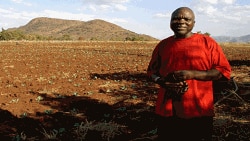A new survey has found that many Africans blame themselves for climate change. A pan-African research project has found that many Africans don't connect changes to the weather with global causes such as emissions of carbon dioxide.
Africa Talks Climate, a research report from the BBC World Service Trust and the British Council, set out to learn about public understanding of climate change in Africa. Over 1,000 people took part in talks across ten Africa countries, including Sudan, South Africa, Kenya, and Ghana.
Sam Otieno is a Kenya researcher for Africa Talks Climate. "They understand and they can see and they are already experiencing the changes and how these changes are affecting them and they can explain that very eloquently. But there is a problem in terms of how they are going to live with these changes and how they are trying to cope and many of them probably feel unable to cope."
He says many of the Africans, especially those in rural areas, are struggling to adjust to changes in the weather.
And he says although people know the weather is changing, they do not connect it to global issues.
He says many people interviewed thought local issues were the cause. "People tend to look at the things that are happening in the environment and in their climate and they tend to blame it on the local human activity, such as local deforestation," Otieno said.
He says, for example, that many people blamed tree cutting for the lack of rain because they believe that trees attract rain.
And some people, the survey found, consider climate change to be the will of God.
Otieno says misunderstandings about the causes of climate change make many people feel powerless. He compares it to the early days of the HIV/AIDS pandemic. "The current communication around climate change is facing almost similar challenges that were faced back when people were beginning to communicate about HIV and AIDS. And I think people are going to need a lot of information and resources to be able to get this information and down to be able to make it beneficial to Africans," he said.
Fossil fuel emissions in Africa are less than 4 percent of the global total, but scientists say the continent is likely to be hit hardest by climate change.
Study Finds Many Africans Blame Themselves for Climate Change








